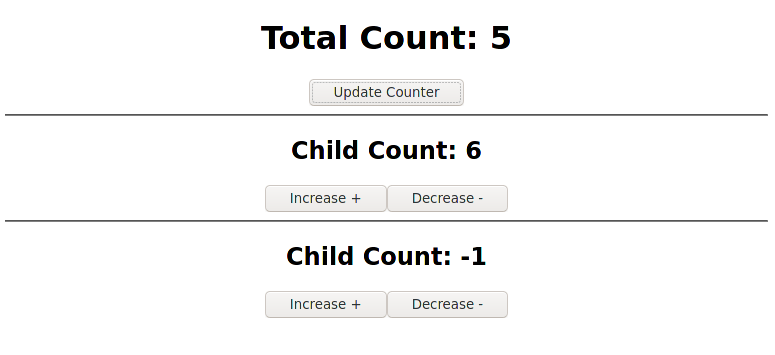Generally, this is not the way to go about handling things in React. Usually what you want to do is hoist the states and the functions to the parent and pass data down as props (Lifting State Up).
But if you must expose an imperative method on a child component, you can use refs. Remember this is an escape hatch and usually indicates a better design is available.
The Problem
In this example we will create a simple counter application with the 2 individual counters. It will update the total count value (sum of the 2 counter values) only when the user clicks on the Update Counter button. To give an illustration, this is what we are going to build.
In case the above link no longer works:

Let's start with creating a basic counter component, which is very simple.
import React, { useState } from "react";
function Counter() {
const [count, setCount] = useState(0);
function increaseCounter() {
setCount(count + 1);
}
function decreaseCounter() {
setCount(count - 1);
}
function getCount() {
return count;
}
return (
<div>
<h2>Child Count: {count}</h2>
<button type="button" onClick={increaseCounter}>
Increase +
</button>
<button type="button" onClick={decreaseCounter}>
Decrease -
</button>
</div>
);
}
export default Counter;Now, the problem is that we need to get access to the states of the children to sum the value of the counters, which currently are only available in the children.
useImperativeHandle to the rescue
To achieve what we are building, there are different approaches, but in this case, we will be using useRef, forwardRef and useImperativeHandle.
To begin, we need to pass a ref from the parent to the children component. So that we can access to the children properties from the outside.
import React, { useState } from "react";
function Counter(props, ref) {
// ... Rest
}
export default forwardRef(Counter);Then, we will create this function in the child component.
function getCount() {
return count;
}Obviously, it's a simple function which returns the current count state of the component. We will need to access to this function in the parent to get the value it returns. This is where useImperativeHandle comes to play.
useImperativeHandle(ref, () => {
return {
getCount: getCount,
};
});Then in the parent component, we can reach getCount function appealing to ref.current
import React, { useState, useRef } from "react";
import Counter from "./components/Counter";
function App() {
const [totalCount, setTotalCount] = useState(0);
const counterOne = useRef(null);
const counterTwo = useRef(null);
function updateCounter() {
const counterOneCount = counterOne.current.getCount();
const counterTwoCount = counterTwo.current.getCount();
setTotalCount(counterOneCount + counterTwoCount);
}
return (
<div className="App">
<h1>Total Count: {totalCount}</h1>
<button type="button" onClick={updateCounter}>
Update Counter
</button>
<hr />
<Counter ref={counterOne} />
<hr />
<Counter ref={counterTwo} />
</div>
);
}That's it, now everytime we click the Update Counter button, it will update the total count value base on the current count of the 2 counters.
Here is a working CodeSandbox for the example.
To sum it up, we use useRef which returns a mutable ref object whose .current property is initialized to the passed argument. The returned object will persist for the full lifetime of the component. Now, the function getCount is initialized in .current property of ref thanks to the help of useImperativeHandle. So that the function can be called from the parent component where its ref has been passed down to the child component by using forwardRef.

